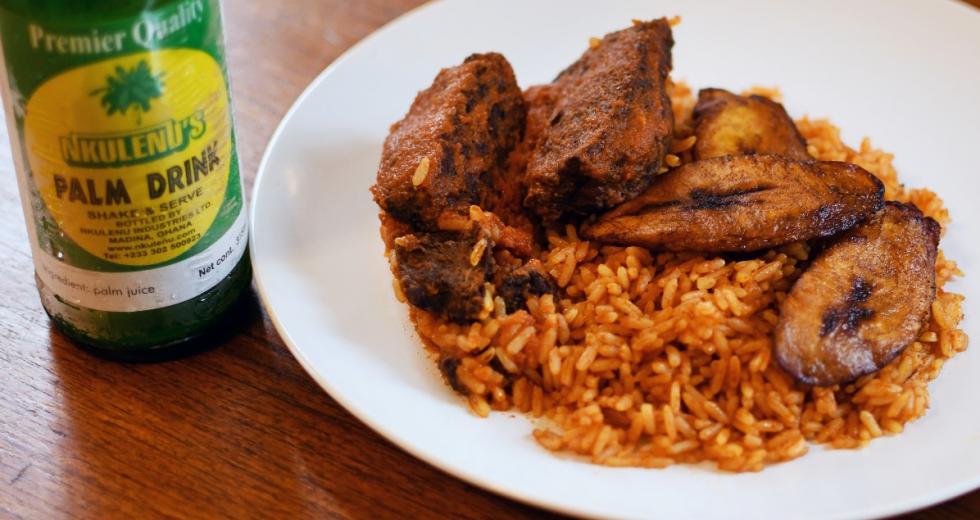One of the latest trends on TikTok — the video-based social media platform with an insatiable appetite for fads — is called the fufu challenge. Fufu is a West African staple food made from boiled, pounded cassava or other starches, and the challenge lies mostly in finding it.
West African restaurants are scarce in most of the United States, despite the variety and vibrance of the region’s many cuisines. Some TikTokers drive an hour or more to reach the one nearest them. They post videos of themselves patting the pillow-like mounds of fufu, pinching off pieces with their fingers and dipping them into soup, as they’ve learned from other videos. In the Capital Region, most end up at Naija Cuisine, the only Nigerian restaurant in Sacramento.
Not all of the TikTok takes are positive — some top videos show people spitting out chewed lumps of food — but Naija Cuisine owner Adeola Adedayo says she’s only heard positive feedback from her new customers. “It’s been really good,” she says. “Most people eat the fufu in their car, and they come back for an extra plate. ‘Mmm, this is nice! Can I have more?’ they say.”
Without TikTok, these new customers may never have found the place. Naija Cuisine occupies a former taco counter in the Mexican grocery store La Delicia Market in Northgate and has no signage other than two rumpled banners on the window. A partial wall, deep blue and decorated with African and Cuban art, separates the two businesses, but they’re still close enough that the grocery cashier can see into Naija’s kitchen from behind her plexiglass barrier.
In the kitchen are rows of pots bubbling with the soups and stews that define Nigerian cuisine, each a study in textural contrast. Among the options are ewedu, a puree of jute leaves and locust beans the color of fresh-cut grass; egusi, coarse with ground seeds that yield like peanut butter under the teeth; and ogbono, a stew made with cow feet and African mango seeds that is prized for its “draw” — a buoyant stringiness like that of okra. These are traditionally eaten by hand, fufu serving as both starch and spoon. There is also jollof rice, each grain dyed tomato-red and suffused with spice, which Adedayo considers a gateway to the rest of the menu. “If anyone can tolerate the spiciness of the jollof rice, then the person can move forward and try the other dishes,” she says.
Egusi soup is made with pumpkin and melon seeds and is eaten by
hand with fufu, a cassava-based staple.
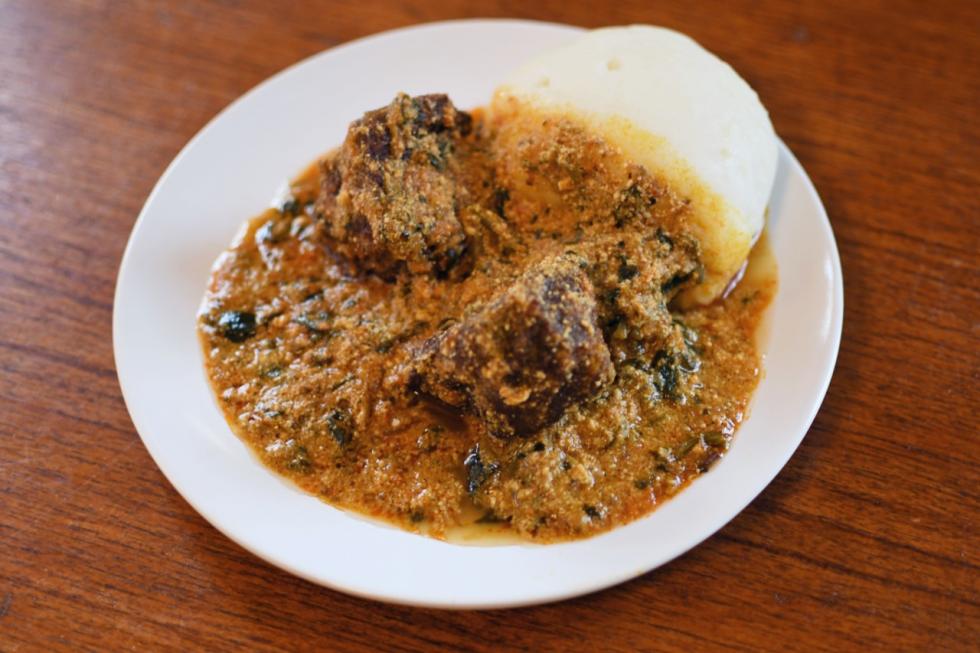
One thing she will not do is tone down the spice, funk or mucilaginousness of any dish to suit the American palate. “I’m not trying to do shortcuts,” Adedayo says. “I’m not trying to modernize it, you know, to make it the American way. I want it to be the way we cook back home, be authentic.”
Home for Adedayo is Abuja, an affluent city built in the 1980s that became the capital of Nigeria in 1991. Her mother, a restaurateur, moved there with her family in the ’90s and grew her career in step with the burgeoning capital. At the height of her power, she owned numerous branches around the city, including the canteens at the headquarters of the World Bank and the Economic Community of West African States. These were no workaday cafeterias but fine-dining affairs with three-course meals, says Adedayo, who eventually oversaw three of her mother’s branches.
In the early 2000s, Adedayo left Nigeria “for greener pastures,” she says — though the pasture she chose, Stockton, is about as brown and hot in the summer as Abuja. After finishing her nursing degree there in 2006, she opened an assisted living facility, Bloom’s Room and Board, in Sacramento. The business later grew to include multiple locations around the city, all but one of which have been sold.
Adedayo never planned to become a restaurateur like her mother, but when she noticed there were no West African restaurants in Sacramento, she saw a niche waiting for her. “I feel my service is needed here,” she says. “I decided I wanted people to try West African dishes. … I have to bring it on the table for them to face and know that we have very good food in West Africa. That’s why I started my restaurant.”
Naija Cuisine is located inside La Delicia Market in the
Northgate neighborhood of Sacramento.
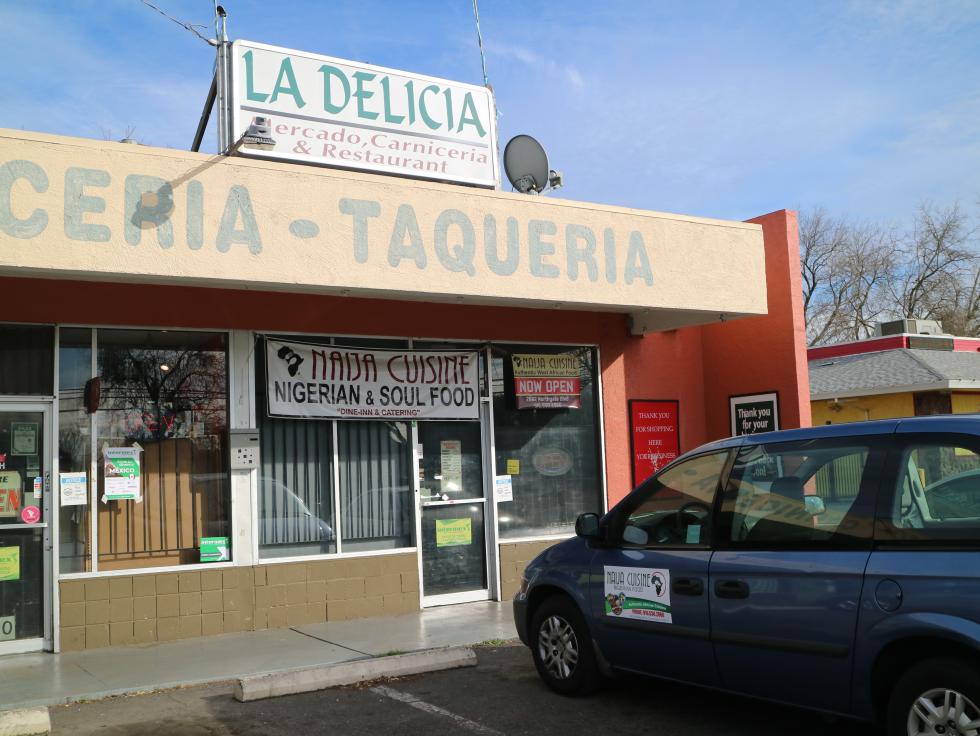
From the outside, the current location is even harder to recognize as a West African restaurant, with the words “Mercado - Carniceria – Taqueria” on the awning above. Still, more customers than ever are finding out about Naija Cuisine. On a recent visit, everyone in line for takeout appeared to be a first-timer, asking about everything on the menu, the drinks in the cooler, the art on the walls. Adedayo stood behind the counter and fielded questions, laughing often.
A man asked why he had to wait half an hour before his okra soup would be ready. “We’re making it fresh for you, honey,” Adedayo said. “We do it right here.” So he said he would be happy to wait.
–
Stay up to date on business in the Capital Region: Subscribe to the Comstock’s newsletter today.
Recommended For You

Appetite for Equity
Black-owned restaurants rely on community support to endure the pandemic and racial inequity
The community has begun to increase its support of Black-owned restaurants due to the heightened awareness of the inequities Black businesses face, but will it last?

Finding a New Vegan Vision
Food entrepreneurs on the verge of opening brick-and-mortar locations retool their businesses — and find silver linings
Many Sacramento entrepreneurs, when forced to consider what it
means to launch a business during a time of crisis, realized
there could be plant-based opportunities.
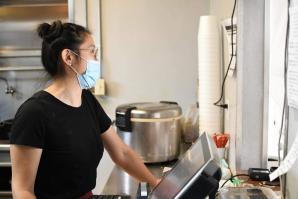
A Double-Edged Service
Third-party delivery services help — and hinder — restaurants during COVID-19
The commission delivery companies take per order, a range between 20-40 percent, has many wondering if these services are taking advantage of an unfortunate situation.
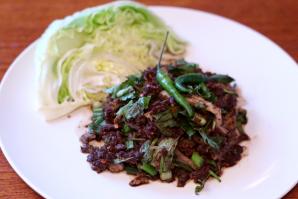
Neighborhood Favorite: South Area Market
Neighborhood Favorite is a new monthly web column that profiles
independent restaurants around the Capital Region to showcase the
diversity and resilience of our local food entrepreneurs. In the
first installment, we visit one of Sacramento’s longest-standing
Lao restaurants.



